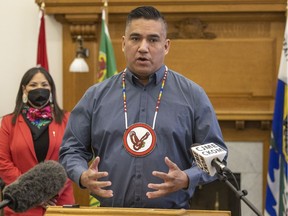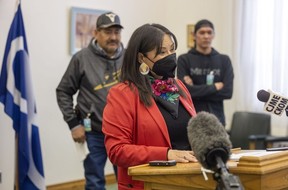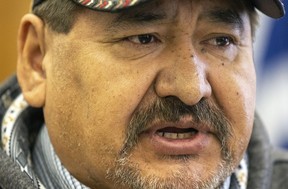Nippi-Albright bill aims to transform duty to consult for Indigenous communities
Chief Evan Taypotat of Kahkewistahaw First Nation said he’s looking for a hand up and a seat at the table to help his community prosper.
Author of the article: Jeremy Simes
Publishing date: Apr 13, 2022

Kahkewistahaw First Nation Chief Evan Taypotat speaks at a NDP press conference at the Legislative Building on April 13, 2022 in Regina.
PHOTO BY TROY FLEECE /Regina Leader-Post
Article content
Near a potash mine in southeast Saskatchewan sit two different communities — Esterhazy and Kahkewistahaw First Nation.
The difference, according to Chief Evan Taypotat, is his community doesn’t have the million dollar homes, nice stores and burgeoning opportunity. This, he says, is a result of industry and governments not willing to sit down at the table.
“Potash companies throw us a trinket and a bead, and all the nice jobs go to the non-Indigenous folks,” he told reporters Wednesday. “When these potash companies come into our territory, we want to sit at the table.”
The idea of meaningful consultation is at the crux of a new private members’ bill presented by NDP MLA Betty Nippi-Albright.
Flanked by a delegation representing six First Nations communities, Nippi-Albright explained Bill 609 aims to bolster the existing duty to consult process.

Article content
Near a potash mine in southeast Saskatchewan sit two different communities — Esterhazy and Kahkewistahaw First Nation.
The difference, according to Chief Evan Taypotat, is his community doesn’t have the million dollar homes, nice stores and burgeoning opportunity. This, he says, is a result of industry and governments not willing to sit down at the table.
“Potash companies throw us a trinket and a bead, and all the nice jobs go to the non-Indigenous folks,” he told reporters Wednesday. “When these potash companies come into our territory, we want to sit at the table.”
The idea of meaningful consultation is at the crux of a new private members’ bill presented by NDP MLA Betty Nippi-Albright.
Flanked by a delegation representing six First Nations communities, Nippi-Albright explained Bill 609 aims to bolster the existing duty to consult process.

Opposition critic for First Nations and Métis relations Betty Nippi-Albright says her new bill would prevent decisions from happening without First Nation input.
PHOTO BY TROY FLEECE /Regina Leader-Post
She said it would ensure that Indigenous communities are meaningful partners when impacted by Crown land sales or other developments. It would allow them to determine the consultation process.
“Industry needs to involve Indigenous people and the government needs to involve Indigenous people,” said Nippi-Albright, the NDP critic for First Nations and Métis relations.
She explained the current process sees the province write a letter and have a “one-off meeting,” with decisions being made prior to consultation.
“The first thing that the government should be doing is contacting the nations and say, ‘Here’s what’s coming down the pipe, we need to talk to you and give you that heads up,’” she said. “You’re at that table when this is happening, not after a decision has been made.”
In B.C., Taypotat said, industry asks First Nations for permission. In Saskatchewan, he said First Nations have to beg.
“That is wrong,” he said. “We have potash companies coming into Saskatchewan, making millions, billions of dollars.”
He said the First Nation foremost wants to protect the environment and the water. Secondly, it wants procurement, which creates management and leadership jobs.
“We don’t want a hand out. We want a hand up,” he said. “We want to work just as hard as the next company; we want to work just as good. We want to produce product.”
After meeting with members of the First Nations, Government Relations Minister Don McMorris told reporters he understands their concerns and is willing to re-look at the duty to consult process.
He said the province will begin engagement this year to hear from First Nations communities about the current system, which hasn’t been updated in 12 years.
“Maybe there has to be some more policy put in place where industry knows what is expected to properly consult. A fax is not consulting,” he said. “It’s a communications piece that isn’t taking place. That’s what we’re hearing.”
While McMorris said the province plans to put forward a new Indigenous Investment Finance Corporation to increase involvement in the economy, he’s open to bridging gaps between First Nations and industries.
“It’s real in their life, obviously, and I can imagine how they are frustrated with that,” he said, though added he has questions about how far government should go to get between private business.
Kahkewistahaw First Nation and Onion Lake Cree Nation have written letters to the province raising concerns about not being consulted about Crown land sales.
Nippi-Albright has called for a pause on sales of such land.
She added that these lands are essential for Indigenous hunters, trappers and traditional land users.

“Industry needs to involve Indigenous people and the government needs to involve Indigenous people,” said Nippi-Albright, the NDP critic for First Nations and Métis relations.
She explained the current process sees the province write a letter and have a “one-off meeting,” with decisions being made prior to consultation.
“The first thing that the government should be doing is contacting the nations and say, ‘Here’s what’s coming down the pipe, we need to talk to you and give you that heads up,’” she said. “You’re at that table when this is happening, not after a decision has been made.”
In B.C., Taypotat said, industry asks First Nations for permission. In Saskatchewan, he said First Nations have to beg.
“That is wrong,” he said. “We have potash companies coming into Saskatchewan, making millions, billions of dollars.”
He said the First Nation foremost wants to protect the environment and the water. Secondly, it wants procurement, which creates management and leadership jobs.
“We don’t want a hand out. We want a hand up,” he said. “We want to work just as hard as the next company; we want to work just as good. We want to produce product.”
After meeting with members of the First Nations, Government Relations Minister Don McMorris told reporters he understands their concerns and is willing to re-look at the duty to consult process.
He said the province will begin engagement this year to hear from First Nations communities about the current system, which hasn’t been updated in 12 years.
“Maybe there has to be some more policy put in place where industry knows what is expected to properly consult. A fax is not consulting,” he said. “It’s a communications piece that isn’t taking place. That’s what we’re hearing.”
While McMorris said the province plans to put forward a new Indigenous Investment Finance Corporation to increase involvement in the economy, he’s open to bridging gaps between First Nations and industries.
“It’s real in their life, obviously, and I can imagine how they are frustrated with that,” he said, though added he has questions about how far government should go to get between private business.
Kahkewistahaw First Nation and Onion Lake Cree Nation have written letters to the province raising concerns about not being consulted about Crown land sales.
Nippi-Albright has called for a pause on sales of such land.
She added that these lands are essential for Indigenous hunters, trappers and traditional land users.

Onion Lake Cree Nation Councillor Hubert Pahtayken.
PHOTO BY TROY FLEECE /Regina Leader-Post
Onion Lake Cree Nation Coun. Hubert Pahtayken told reporters the province plans to sell Crown land located next to the First Nation. It has been used for hunting and gathering medicines.
“Without consultation to our people, they sell them,” he said. “For whatever reason, the province doesn’t look at our situations.”
When asked if the province would consider pausing Crown land sales, McMorris said the government needs to review how it’s engaging with Indigenous communities.
“I’m not sure if it’s necessarily a freeze, but to look at that process and how do we better communicate with First Nations to see if they’re interested,” he said. “Some of these parcels of land are pretty small … so a freeze would impact all of that. I’m not sure that is useful for all.”
jsimes@postmedia.com
Onion Lake Cree Nation Coun. Hubert Pahtayken told reporters the province plans to sell Crown land located next to the First Nation. It has been used for hunting and gathering medicines.
“Without consultation to our people, they sell them,” he said. “For whatever reason, the province doesn’t look at our situations.”
When asked if the province would consider pausing Crown land sales, McMorris said the government needs to review how it’s engaging with Indigenous communities.
“I’m not sure if it’s necessarily a freeze, but to look at that process and how do we better communicate with First Nations to see if they’re interested,” he said. “Some of these parcels of land are pretty small … so a freeze would impact all of that. I’m not sure that is useful for all.”
jsimes@postmedia.com
No comments:
Post a Comment